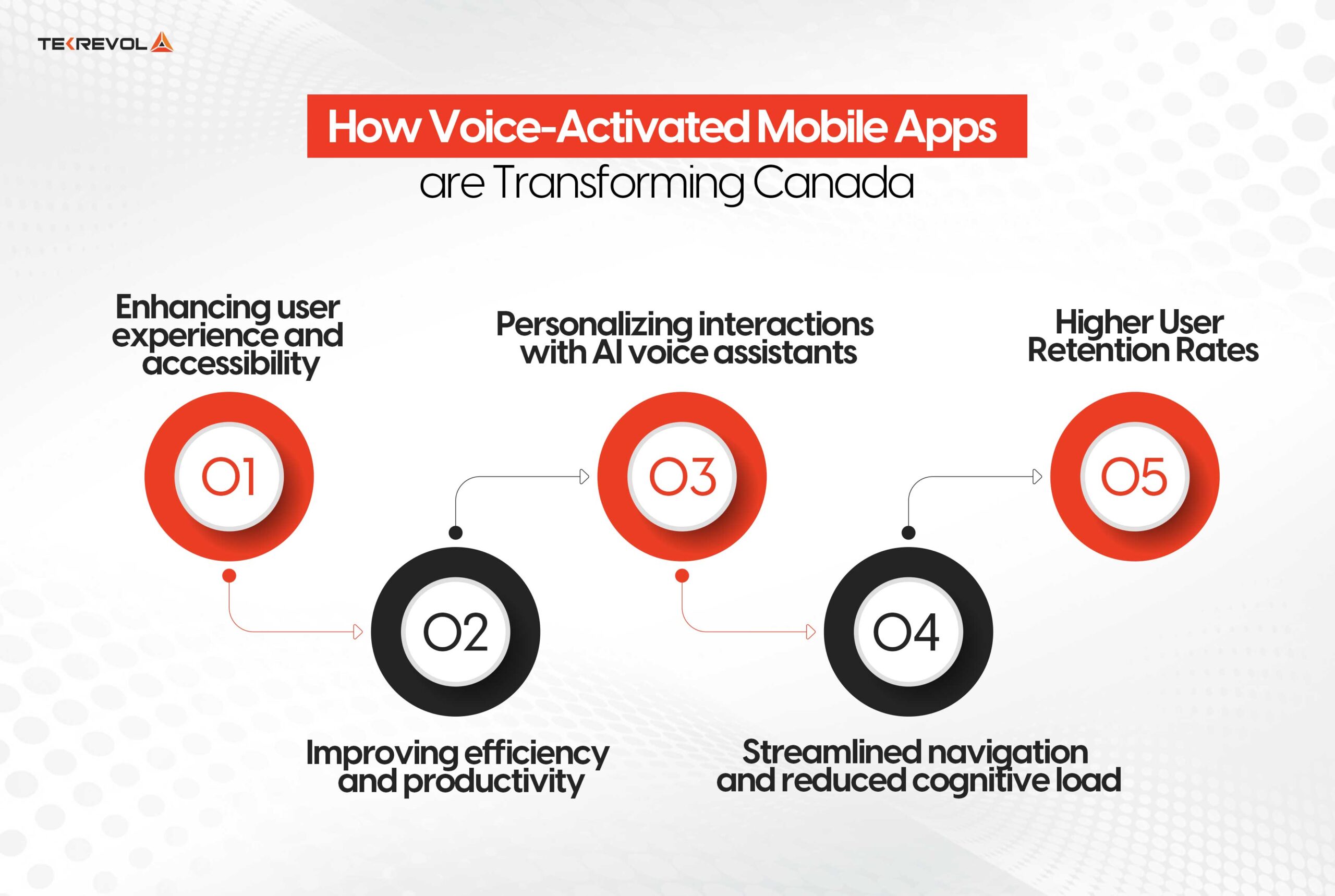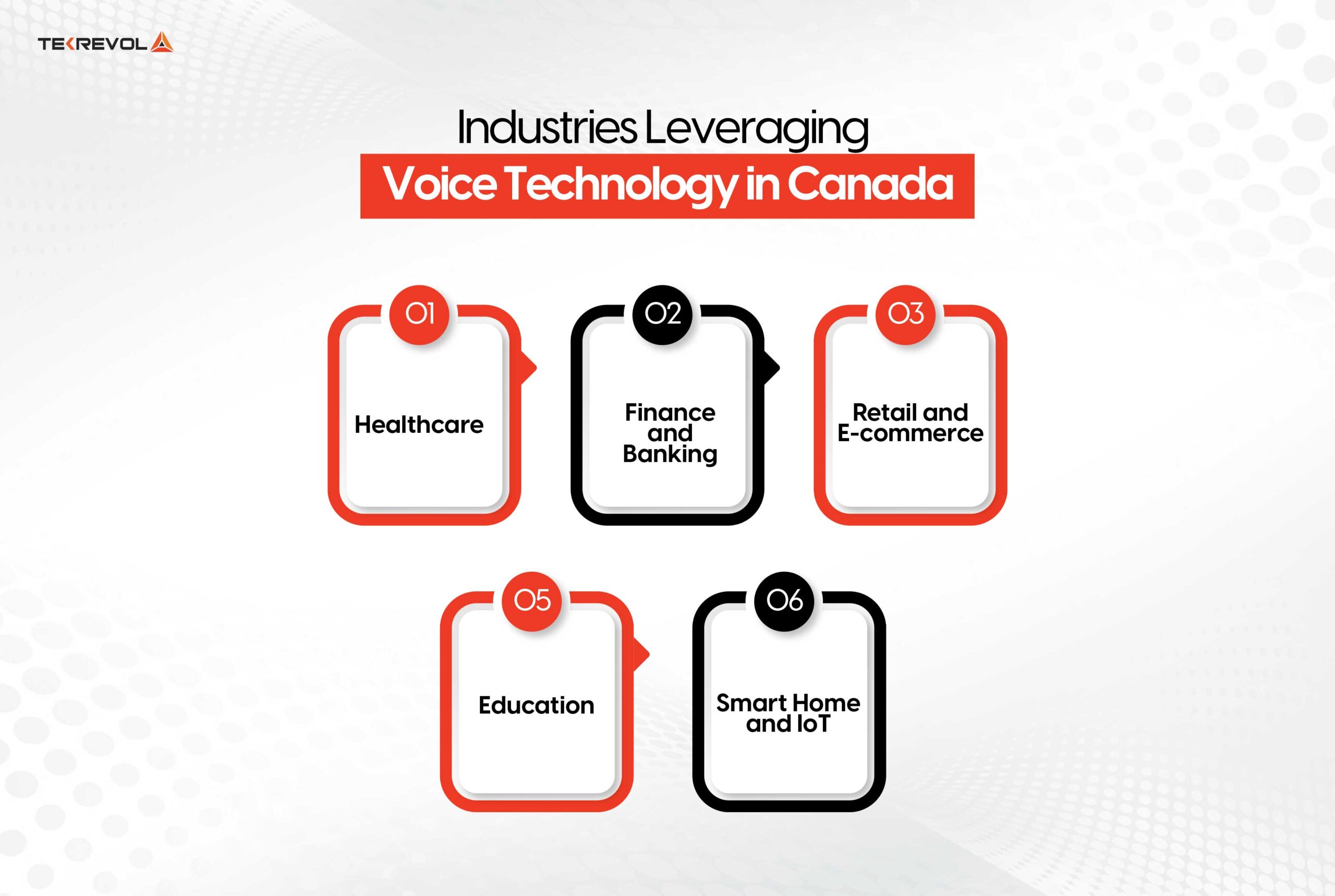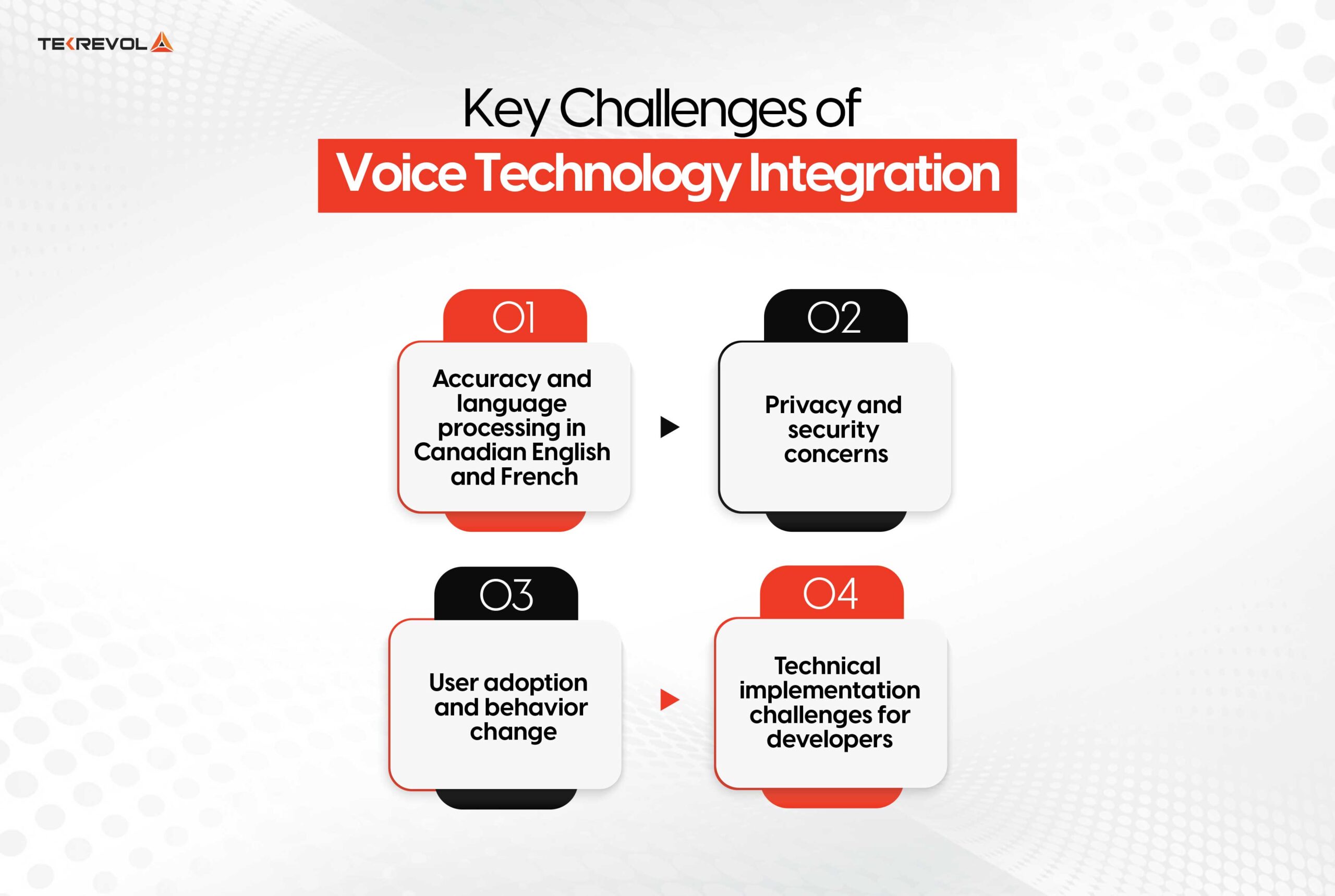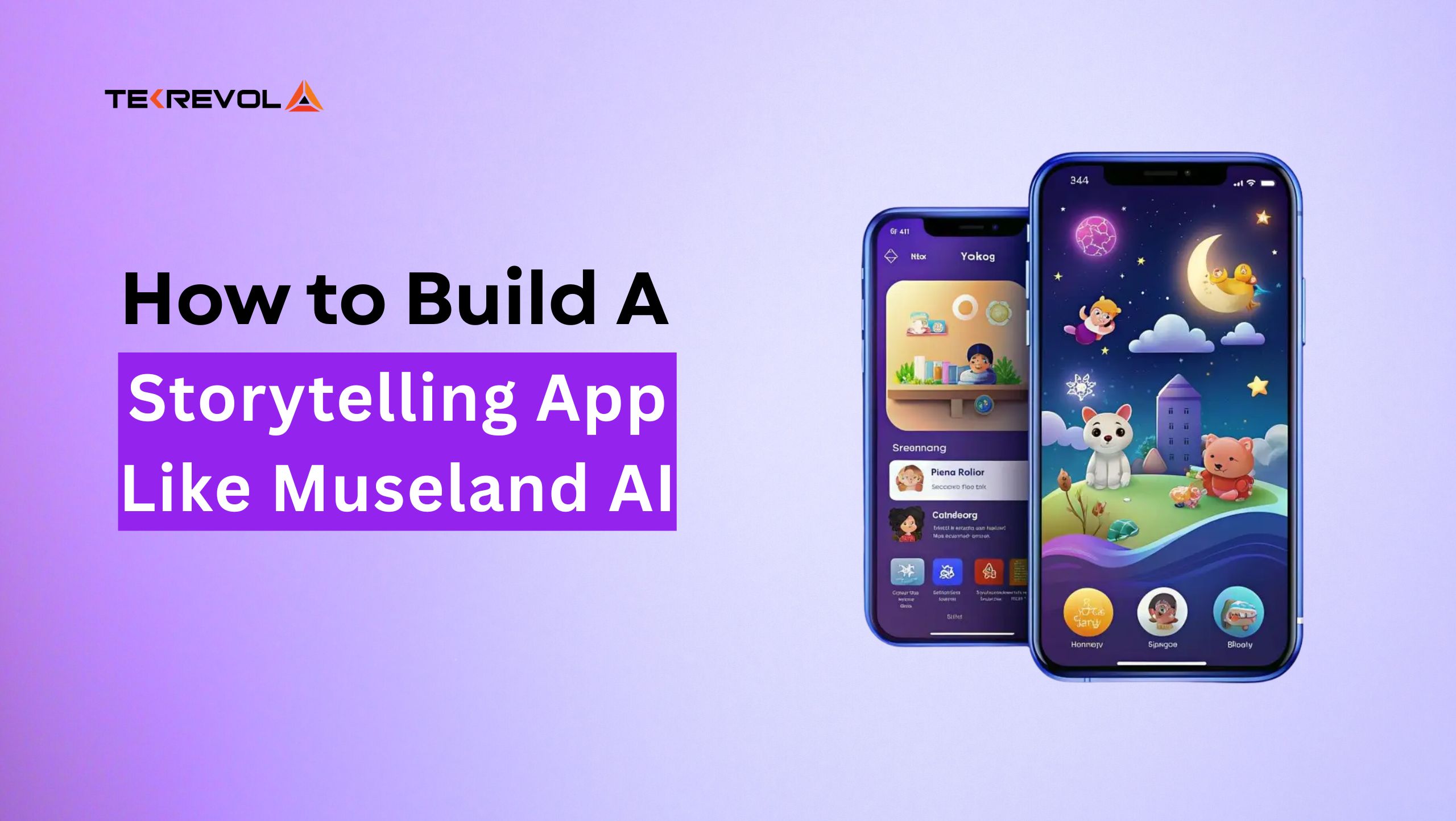Jenna steps into her Toronto condo after a long day at work. She wants to prepare dinner but also needs to unwind first. “Hey Siri, defrost salmon and play 5 AM in Toronto,” she calls out while heading to the shower. As she gets ready, her voice assistant plays Drake. Just another evening in the life of a tech-savvy Canuck!
This scenario from a Canadian household exemplifies how far we’ve come with voice recognition technology. It all started with Alexa and Siri. Our parents who once struggled with “what’s this thing speaking?” are now using it for setting reminders and controlling smart home devices.
Fast forward to today, 70% of smartphone owners in Canada are interested in getting things done by speaking instead of typing or touching. (Guilty as charged, eh?)
But apart from modernism and convenience, the rise of “voice tech integration” has given birth to a huge business opportunity. The first-mover advantage is pushing forward-thinking entrepreneurs in Canada to funnel their initial seed investments into developing Voice-Activated Mobile Apps.
But is it even worth it? Will these voice-powered apps actually take off in the Great White North? What’s the real impact of Voice Tech on Canadian Mobile Apps, and why should you jump on this bandwagon now?
If you’re scratching your head over these questions, stick around. This blog will spill the beans on why AI Voice Assistants might just be Canada’s next big thing.
The Rise of Voice Tech in Canada
Voice technology is booming in Canada, with the way it is changing interaction with devices by Canadians. Just recently, a study was conducted by Media Technology Monitor showing that 25% of Canadians start using voice assistants daily.
This influx is creating an emerging wave of voice-activated mobile apps in the country.
The numbers don’t lie; according to Think with Google, 71% of smartphone users in Canada want voice-activated digital assistants.
This high interest is forcing app developers to integrate voice features in their products. Young adults between 18 and 34 years are at the forefront of the charge, with 77% using voice search on their smartphones .
Several Canadian firms have taken a lead in an attempt to fully utilize this development. For instance, TD Bank released its TD Voice ID for mobile banking through phones, and the CBC produced a voice-commanded news application for smart speakers.
These apps exemplify voice tech as now a significant constituent of the digital map of Canada.
PS: Interested in developing a mobile app in Canada? Read our comprehensive blog on How Much Does It Cost To Build An App In Canada.
How Voice-Activated Mobile Apps are Transforming Canada
Voice-activated mobile apps are changing the game for Canadians. Be it grocery orders or smart homes management, the above apps make daily life much more accessible for normal living. Of all the new and trendy ways that mobile apps would be made in 2025, there have to be AI voice assistants.

With first-hand exposure from our standpoint as a prominent Toronto-based mobile app development firm, we observe that voice technology is revolutionizing the face of Canadian apps.
Here are some of the most promising benefits of voice tech in app development:
Enhancing user experience and accessibility
Voice commands make applications much easier to use, particularly for those with disabilities when interacting with touch screens. Canadians can check their balance in the bank or order groceries using their voice. It is of special importance to the visually impaired or those facing mobility challenges.
Improving efficiency and productivity
Voice-activated apps help users get things done faster. Instead of typing out long messages or search queries, people can simply voice their requests. This saves time and makes multitasking a breeze. For example, drivers can safely navigate and send messages without taking their hands off the wheel.
Personalizing interactions with AI voice assistants
Voice assistants learn with each interaction and get better over time in understanding the user’s preferences. Such a thing creates more personalized experiences, such as suggesting restaurants according to past choices or reminding one of upcoming appointments.
Streamlined navigation and reduced cognitive load
Voice commands simplify app navigation, reducing the mental effort needed to find and use features. Users don’t have to remember where buttons are or how to navigate complex menus. This is especially useful for apps with lots of features or data.
Higher User Retention Rates
Apps with voice features often see better user retention. People are drawn to the novelty and convenience of voice commands. As users get comfortable with voice interactions, they’re more likely to stick with apps that offer this feature. This is an opportunity for app developers to continue engaging and re-engaging their users.
As a mobile app development company based in Toronto, we are witnessing firsthand how voice technologies are changing the facial design of apps in Canada. It is not just cool tech, but useful and accessible to everyone.
Industries Leveraging Voice Technology in Canada
Apart from enhancing lifestyle and adding convenience to personal activities, voice-activated mobile apps in Canada have massive potential across various industries. Let’s explore how different sectors are using this technology to transform their operations and services.

Healthcare
Voice technology is revolutionizing Canadian healthcare with new ways of improving patient care and streamlining operations.
AI-powered voice assistants are transforming patient care and monitoring through checks with patients to inquire about their symptoms and remind them of their medication intake. This technology is also important in chronic diseases management by asking patients to report their vital signs, such as blood sugar.
Voice recognition systems also improve medical documentation. With this, medical professionals can directly dictate their notes into electronic medical records, which saves time and reduces errors.
With voice commands, nurses can record medication administration without having to use their hands, thereby freeing up their time for patient care. This technology is not only making the processes more efficient but also improves the quality of patient care.
Finance and Banking
Canadian financial institutions are adopting voice technology to enhance security and improve customer service.
Voice-authenticated transactions have become increasingly popular, with several major Canadian banks, including RBC, Barclays, and Santander, introducing voice recognition for payments via Siri. This technology adds an extra layer of security to financial transactions.
AI-powered voice banking assistants transform the customer experience with banks. These assistants can enable account balance checks, fund transfer, and even offer monetary advice.
For instance, TD Bank unveiled TD Voice ID in phone banking, providing customers with easy access to accounts by a secure login process. It not only enhances the customer experience but also reduces the burden on customer service representatives..
Retail and E-commerce
Voice technology is changing the way Canadians shop and in the shopping experience that has become convenient and more personalized. The retail sector is building new avenues for businesses and consumers with voice-activated mobile apps.
- Voice shopping enables the customer to add items to the cart over time, which is a fit for their natural shopping habits.
- In-car voice tech lets shoppers make purchases while on the go, like ordering stain remover after spilling coffee.
- Voice assistants can give personalized product recommendations based on past purchases and preferences.
The North American voice assistants market was estimated to reach $22 billion by 2030 , which reflects a growing role in retail. Such a trend can be considered to be an example of the complete shift in the behavior of customers and requires changes in the nature of business based on voice-activated technologies..
Education
Voice technology is adding new avenues of learning and accessibility to Canadian classrooms.
Students can be helped to practice reading aloud with voice-assisted learning platforms, which give instant feedback on pronunciation and fluency. This is very useful in language learning as it will provide some speaking practice.
Voice technology is breaking the barriers to education for students with disabilities. As no manual skills are required, voice command makes it much easier for students who are physically handicapped to interface with educational content.
Text-to-speech features allow students with visual impairments to easily access written materials. This technology not only improves the learning experience but also enhances the inclusiveness of education.
Smart Home and IoT
More Canadians are using voice technology to control their homes and interact with smart city features.
Voice-controlled home automation is becoming more prevalent, with 20% of Canadian internet users expected to own a smart speaker by the end of 2019. This technology allows users to control lighting, temperature, and security systems with simple voice commands.
As cities become smart, voice technology may play a very crucial role in getting access to public services, reporting problems, or finding real-time information about transit. This integration would make city living more efficient and user-friendly for Canadians.
Voice technology has enormous potential in making smart cities work better, be it improving public transportation or emergency response systems.
With the continuous progression of this technology, we will definitely see even more innovative applications across other sectors that continue to improve the efficiency, accessibility, and the user experience itself.ce
Key Challenges of Voice Technology Integration
Is voice tech integration really a happy, smooth ride? Well, experts think otherwise.
Developing a voice-activated app and launching it in the market to engage users successfully is not a cake walk. Especially when you haven’t partnered with a reliable mobile app development company in Toronto.

Here are some of the key challenges faced by developers and businesses in Canada when integrating voice technology into their apps:
Accuracy and language processing in Canadian English and French
In most voice recognition systems, one finds difficulties while processing the peculiar elements of Canadian English and French. The diversified accent, dialect, and bilingual culture of Canada creates severe problems.
For example, voice assistants might not pick up Québécois French or the dialectic pronunciations in Newfoundland English. That leads to disappointing user experiences, limiting the scope of voice-activated mobile app adoption across all Canadian regions.
Privacy and security concerns
As voice technology collects and processes sensitive user data, privacy and security become major concerns. Canadian users are increasingly wary of how their voice data is being used and stored.
They should ensure their applications comply with PIPEDA or other strict data privacy laws that exist in some countries. Such applications should utilize appropriate and robust encryption to ensure that information is properly managed and safe for users. Legal issues would not arise when they have won user trust.
User adoption and behavior change
Even though voice technology is increasingly popular, most Canadians are not comfortable using voice commands in public or for certain tasks. It is difficult to change user behavior and encourage adoption of voice-activated features.
Some users may feel uncomfortable talking to their devices, while others may be concerned about the accuracy or reliability of voice commands. Overcoming these psychological barriers requires careful design and user education.
Technical implementation challenges for developers
Integrating voice technology into existing apps or building voice-first applications presents several technical hurdles. Developers need to consider factors such as:
- Handling background noise and multiple speakers
- Ensuring low latency for real-time voice processing
- Integrating with various voice platforms and APIs
- Designing intuitive voice user interfaces
The above problems call for skills and expertise, which are challenging and expensive for many Canadian businesses.
By facing these challenges head-on, Canadian app developers and businesses can develop more effective and user-friendly voice-activated mobile apps.
Working with an experienced mobile app development company in Toronto can help you navigate these complexities and deliver successful voice-enabled solutions.
Why It’s the Best Time to Consider Voice Search for Your Business App
If there’s one thing we’re sure about right now, other than the fact that Siri still can’t understand Canadian accents, eh, is that the trend of Voice Tech Integration in mobile apps in Canada is only going to rise.

A. Soaring Demand
The Canadian voice tech market is booming. By 2030, it’s projected to hit US$355.30 million, growing at a rate of 14.24% from 2024 to 2030. This surge shows Canadians are hungry for voice-enabled apps.
B. Stand Out from the Crowd
In a sea of apps, voice features can make yours shine. With 71% of Canadian smartphone owners interested in voice-activated digital assistants, adding voice tech could give you a serious edge.
C. Boost Engagement and Sales
Voice tech isn’t just cool – it’s practical. It can increase user engagement and potentially boost conversions. After all, it’s easier to say “buy now” than to tap through multiple screens.
D. Future-Proof Your App
Voice is the future of tech. So, getting aboard now is making you prepared for the future success of your app. Stay ahead of others in this increasingly rapidly changing digital landscape.
How TekRevol Can Help
Let’s recap what we’ve learned:
- Voice tech is transforming Canadian industries from healthcare to retail
- The market is growing rapidly, with huge potential for innovative apps
- Voice features can give your app a competitive edge
- Integrating voice tech now sets you up for future success
This is where you need a reliable mobile app development company in Toronto to help you ride this voice tech wave. Enter TekRevol.
At TekRevol, we’re not just keeping up with voice tech trends – we’re setting them. Our team of expert developers has a track record of creating cutting-edge voice-enabled apps that users love.
We offer end-to-end development, from initial concept to post-launch support. And we’re not just tech geeks – we’re business savvy, too. We’ll tailor your voice app to the unique needs of the Canadian market, ensuring it resonates with your target audience.
Ready to give your app a voice? Let’s chat about how we can make your app the talk of the town – literally.







![What is Visual Regression Testing [2025 Definitive Guide]](https://d3r5yd0374231.cloudfront.net/images-tek/uploads/2025/11/Feature-19.jpg)


